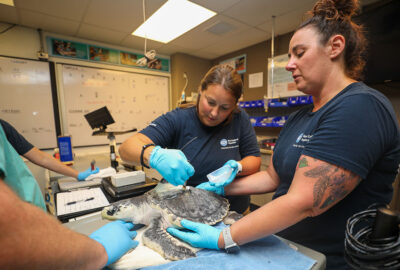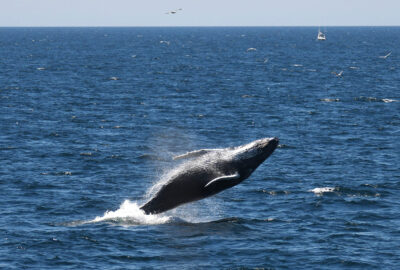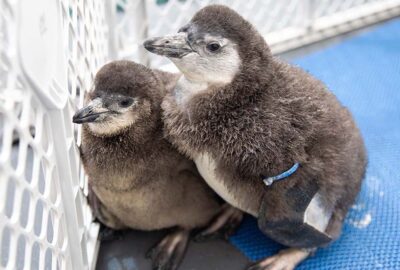2021 Year in Review
From new techniques to treat and monitor animals in our care and in the wild, to pioneering research that impacts ocean industry and national policy, to inspiring the next generation of ocean heroes, the New England Aquarium worked to protect the blue planet in 2021.
By New England Aquarium on Tuesday, February 01, 2022


Education and Advocacy
Safely Reopening (Again)
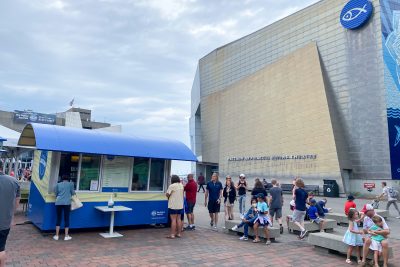 The Aquarium reopened its doors to visitors in February after closing for seven weeks to comply with City of Boston guidance to contain the spread of Covid-19. In June, we expanded our hours for the summer season and opened a new dining option, Central Snack Bar, on the plaza. We also introduced new film offerings in Simons Theatre.
The Aquarium reopened its doors to visitors in February after closing for seven weeks to comply with City of Boston guidance to contain the spread of Covid-19. In June, we expanded our hours for the summer season and opened a new dining option, Central Snack Bar, on the plaza. We also introduced new film offerings in Simons Theatre.
Virtual Lectures
The Aquarium’s Lecture Series, hosted in the spring and fall with major support from the Lowell Institute, presented a range of speakers, including National Geographic photographer and New England Aquarium Explorer-in-Residence Brian Skerry; astronaut and explorer Kathy Sullivan; and academy-award winning filmmaker and naturalist Craig Foster. These virtual events, attended by more than 3,200 participants—focused on marine life, ocean exploration, conservation, and environmental justice.
Sea Walls Boston
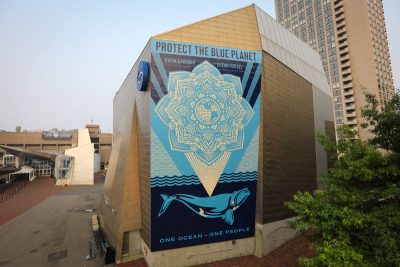 In July, the Aquarium served as the Honorary Conservation Partner for PangeaSeed Foundation’s global event, Sea Walls: Artists for Oceans Program. Known locally as Sea Walls Boston, this week-long mural festival raises awareness of marine conservation and coastal resiliency through ocean-themed public art and events. Sea Walls Boston commissioned 14 new ocean-advocacy murals, including a mural of a North Atlantic right whale painted on the side of the Aquarium’s Simons Theatre by acclaimed artist Shepard Fairey. NEAq also hosted a film screening of Fairey’s “Obey Giant” and panel discussion titled “Countdown to 2030: Leveraging Art and Creativity for the Ocean Decade” in the Simons Theatre. And a team of scientists from the Anderson Cabot Center for Ocean Life at the New England Aquarium (ACCOL) updated participating artists on the environmental issues facing the Gulf of Maine region.
In July, the Aquarium served as the Honorary Conservation Partner for PangeaSeed Foundation’s global event, Sea Walls: Artists for Oceans Program. Known locally as Sea Walls Boston, this week-long mural festival raises awareness of marine conservation and coastal resiliency through ocean-themed public art and events. Sea Walls Boston commissioned 14 new ocean-advocacy murals, including a mural of a North Atlantic right whale painted on the side of the Aquarium’s Simons Theatre by acclaimed artist Shepard Fairey. NEAq also hosted a film screening of Fairey’s “Obey Giant” and panel discussion titled “Countdown to 2030: Leveraging Art and Creativity for the Ocean Decade” in the Simons Theatre. And a team of scientists from the Anderson Cabot Center for Ocean Life at the New England Aquarium (ACCOL) updated participating artists on the environmental issues facing the Gulf of Maine region.
World Ocean Day
In honor of World Ocean Day and in keeping with our commitment of a waterfront accessible to all, we presented a special educational activity on the Harborwalk about invasive species found in Boston Harbor. Led by the Aquarium’s ClimaTeens, live blue TM Ambassadors, and education staff, this two-hour event was free and open to the public.
A Conservation Win
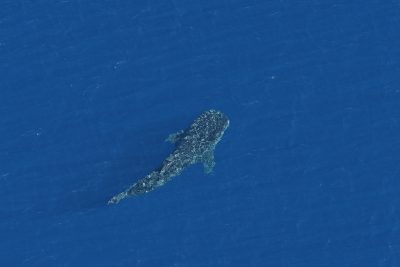
Aquarium scientists, including our aerial survey team, have documented the Northeast Canyons and Seamounts Marine National Monument’s biodiversity for many years. This national treasure, which lies 130 miles east-southeast of Cape Cod, is 4,913 square miles and roughly the size of Connecticut. The monument was designated a national park by President Obama in 2016. It is teeming with ocean life, from corals and invertebrates, to fish, marine mammals, sea birds, sharks, and sea turtles.
In 2020, the Trump administration re-opened the Northeast Canyons and Seamounts Marine National Monument to commercial fishing. To better understand the consequences of such activity, ACCOL Senior Scientist and Chair of the Spatial Ecology, Mapping, and Assessment Program Dr. Jessica Redfern conducted a study, published in July, that determined commercial fishing in NCSM would reduce species protection in this diverse deep-sea habitat. This fall, the Biden Administration reinstated full protections to the Monument. The Aquarium’s President and CEO Vikki Spruill noted the Aquarium’s role in providing the strong scientific evidence that led to the monument’s designation in 2016 and attended the reinstatement ceremony at the White House.
Animal Care, Rescue, and Rehabilitation
Sustainable Breeding
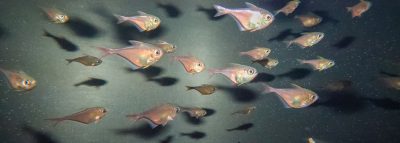 The Aquarium’s Larval Program, in partnership with Roger Williams University, fosters conservation by sustainably breeding select, in-house species—such as glassy sweepers—to avoid removing them from their native habitats. This fall, the Aquarium and Roger Williams University became the first to successfully rear glassy sweepers from egg to adult as a result of the long-standing partnership spearheaded by Dr. Andy Rhyne, professor of marine biology at Roger Williams University and an Aquarium research scientist, and Barbara Bailey, NEAq’s curator of Husbandry and Sustainability. The two organizations designed and installed a dedicated breeding system at the Aquarium’s Animal Care Center, where aquarists provide the perfect care and conditions for breeding these fickle fish.
The Aquarium’s Larval Program, in partnership with Roger Williams University, fosters conservation by sustainably breeding select, in-house species—such as glassy sweepers—to avoid removing them from their native habitats. This fall, the Aquarium and Roger Williams University became the first to successfully rear glassy sweepers from egg to adult as a result of the long-standing partnership spearheaded by Dr. Andy Rhyne, professor of marine biology at Roger Williams University and an Aquarium research scientist, and Barbara Bailey, NEAq’s curator of Husbandry and Sustainability. The two organizations designed and installed a dedicated breeding system at the Aquarium’s Animal Care Center, where aquarists provide the perfect care and conditions for breeding these fickle fish.
Sea Turtle Hospital
The Aquarium’s Sea Turtle Hospital in Quincy, Mass., treated 569 rescued sea turtles recovered from beaches along Cape Cod Bay during the 2020–21 stranding season. In addition to administering to critically endangered Kemp’s ridley turtles, our Sea Turtle Hospital treated loggerhead and green turtles suffering from life-threatening medical conditions, including pneumonia and dehydration. The hospital operated amid strict social distancing guidelines, instituting new population management strategies and temperature-controlled conditions to more efficiently stabilize turtles before transporting them to secondary facilities where they could be released back into warmer waters. The Aquarium also directly coordinated five separate turtle releases along Cape Cod beaches throughout the summer.
Box Turtle Rehabilitation
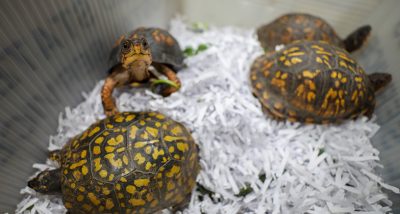 The Aquarium assisted with the care and relocation of nearly 100 eastern box turtles detected at a U.S. port while en route to Asia this fall. As members of the Saving Animals From Extinction (SAFE) American Turtles Program, the Aquarium shared the care for this large group with colleagues at Zoo New England and the Roger Williams Park Zoo. When a ranavirus outbreak among the turtles meant that they could not be returned to the wild, the Aquarium worked to find them a home.
The Aquarium assisted with the care and relocation of nearly 100 eastern box turtles detected at a U.S. port while en route to Asia this fall. As members of the Saving Animals From Extinction (SAFE) American Turtles Program, the Aquarium shared the care for this large group with colleagues at Zoo New England and the Roger Williams Park Zoo. When a ranavirus outbreak among the turtles meant that they could not be returned to the wild, the Aquarium worked to find them a home.
Research and Innovation
Acoustic Tags for Sea Turtles
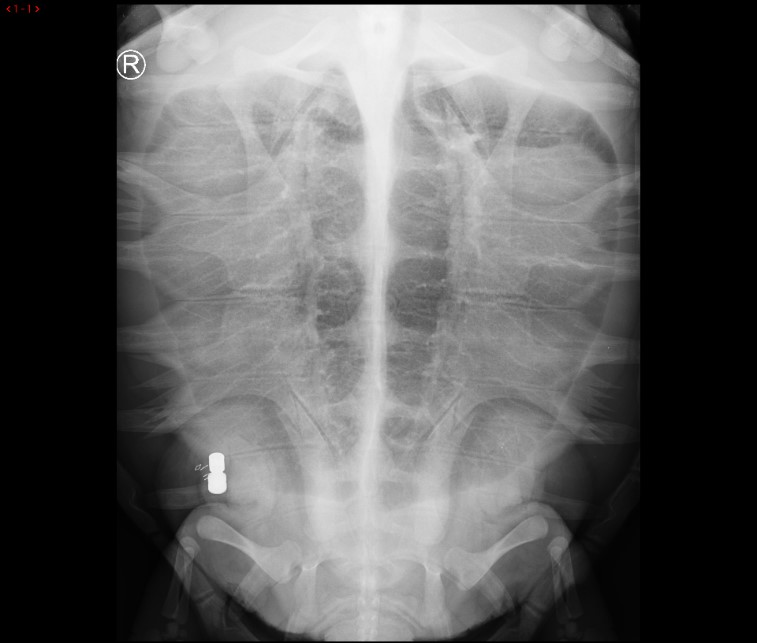 This spring, several members from our Animal Health, Rescue and Rehabilitation, and ACCOL teams made history by surgically implanting acoustic tags in three rehabilitated loggerhead sea turtles. The tags can be tracked by underwater receivers up and down the East Coast of the U.S. This novel procedure will enable our scientists to monitor rehabilitated sea turtles and record their migratory patterns and preferred feeding grounds for up to a decade.
This spring, several members from our Animal Health, Rescue and Rehabilitation, and ACCOL teams made history by surgically implanting acoustic tags in three rehabilitated loggerhead sea turtles. The tags can be tracked by underwater receivers up and down the East Coast of the U.S. This novel procedure will enable our scientists to monitor rehabilitated sea turtles and record their migratory patterns and preferred feeding grounds for up to a decade.
Studying North Atlantic Right Whales
A groundbreaking study published in June and coauthored by Senior Scientist Amy Knowlton at the Aquarium’s Anderson Cabot Center for Ocean Life determined that North Atlantic right whales born in recent years, are three feet shorter, on average, than whales born in the 1980s. The study’s authors found human-induced stressors to be the cause, including fishing gear entanglements, injuries from ship strikes, and shifting feeding grounds as a result of climate change.
Scientists from ACCOL’s Kraus Marine Mammal Conservation Program returned to Canada’s Gulf of St. Lawrence this summer to conduct fieldwork after COVID-19 travel restrictions kept them from visiting in 2020. And ACCOL Research Scientist Dan Pendleton released two studies on how climate change in the Gulf on Maine, which is experiencing the most rapid increase in water temperature in the world and is affecting ocean animals, including North Atlantic right whales.
North Atlantic Right Whale Population
In October, the Aquarium announced, on behalf of the North Atlantic Right Whale Consortium, that the latest population estimate is 336. This marks an eight percent decline in the right whale population since 2019, when the right whale population was estimated at 366.
Shark Resiliency
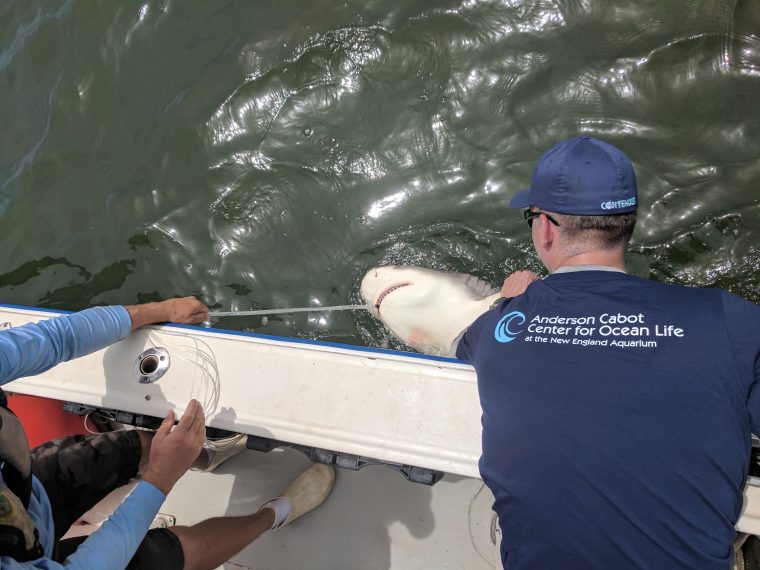 ACCOL Senior Scientist Nick Whitney led a major study on the resilience of some shark species in relation to the stress induced from being caught and released by commercial longline fisheries. Some 300 sharks were tagged over a five-year period in order to measure their blood stress values and determine their survivability when returned to the wild. The study found while some shark species can tolerate catch and release, others, like blacktip sharks, cannot, as demonstrated by a total mortality rate of 62 percent. This research will help inform practices used by commercial fishers in relation to bycatch.
ACCOL Senior Scientist Nick Whitney led a major study on the resilience of some shark species in relation to the stress induced from being caught and released by commercial longline fisheries. Some 300 sharks were tagged over a five-year period in order to measure their blood stress values and determine their survivability when returned to the wild. The study found while some shark species can tolerate catch and release, others, like blacktip sharks, cannot, as demonstrated by a total mortality rate of 62 percent. This research will help inform practices used by commercial fishers in relation to bycatch.
Shark Pups and Rising Water Temperatures
ACCOL scientists and members of the Animal Care team partnered on a study that examined the negative impacts of rising water temperatures on epaulette sharks. Results indicate rising ocean temperatures caused the epaulette shark pups to be born smaller and in a weakened state.
BlueSwell
The BlueSwell Incubator Program won an Honorable Mention in Fast Company’s World Changing Ideas Awards 2021. Our BlueSwell program (a partnership with SeaAhead, Inc.) supports the creation and growth of start-up companies with scalable solutions that enhance ocean health, sustainable ocean industry, and global resilience. In September, BlueSwell accepted its second cohort of bluetech startups.
Civic Leadership
A Downtown Waterfront for All
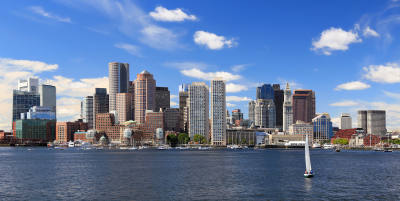 As an organization located on a wharf along Boston Harbor, NEAq recognizes its duty, and that of all downtown waterfront organizations, to prepare for climate resilience, while also ensuring the Aquarium and the entire downtown waterfront remain welcoming, inclusive, and accessible spaces for all visitors and community members. This summer, the Aquarium was among 40 non-profit organizations that joined the Coalition for a Resilient and Inclusive Waterfront to educate Boston’s mayoral candidates and voters on issues impacting Boston’s waterfront in advance of the 2021 municipal elections, with a specific focus on resilience, inclusivity, access, and the economic vitality of Boston’s harbor, islands, and rivers.
As an organization located on a wharf along Boston Harbor, NEAq recognizes its duty, and that of all downtown waterfront organizations, to prepare for climate resilience, while also ensuring the Aquarium and the entire downtown waterfront remain welcoming, inclusive, and accessible spaces for all visitors and community members. This summer, the Aquarium was among 40 non-profit organizations that joined the Coalition for a Resilient and Inclusive Waterfront to educate Boston’s mayoral candidates and voters on issues impacting Boston’s waterfront in advance of the 2021 municipal elections, with a specific focus on resilience, inclusivity, access, and the economic vitality of Boston’s harbor, islands, and rivers.
Boston Mayoral Forum
In July, the Aquarium hosted a mayoral forum in the Simons Theatre focused on critical waterfront issues. Four of the five mayoral candidates participated, including Councilor-At-Large Annissa Essaibi George, Councilor-At-Large (now Mayor) Michelle Wu, Councilor Andrea Campbell, and former City of Boston Chief of Economic Development John Barros.
Conversation on Climate Action
U.S. Senator Edward J. Markey hosted a conversation about climate activism at the Aquarium in August. In a town hall-style presentation on the Aquarium’s Harbor View Terrace, Senator Markey discussed the Civilian Climate Corps, a Biden administration national service initiative for conservation projects; the Green New Deal, which aims to address climate change, job creation, and economic inequality through public policy; and other measures the U.S. Senate must take to ensure that legislative action meets the scope and scale of the climate crisis.
Legislative Breakfast
The Aquarium held its first annual legislative breakfast for more than 70 members and staff of the Massachusetts State Senate and House of Representatives in September. 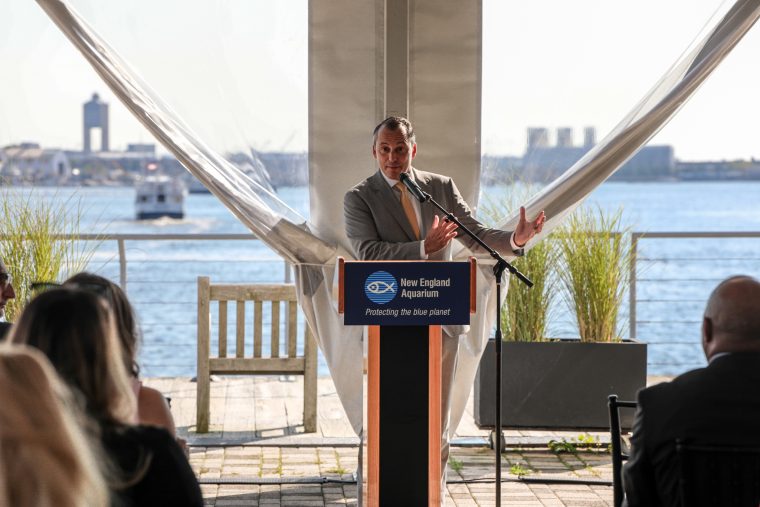 Aquarium President and CEO Vikki Spruill and House Ways and Means Committee Chairman Aaron Michlewitz (pictured at right) co-hosted the breakfast in the Harbor View Terrace tent, which featured presentations on the Aquarium’s work to advance ocean conservation and waterfront resiliency.
Aquarium President and CEO Vikki Spruill and House Ways and Means Committee Chairman Aaron Michlewitz (pictured at right) co-hosted the breakfast in the Harbor View Terrace tent, which featured presentations on the Aquarium’s work to advance ocean conservation and waterfront resiliency.

